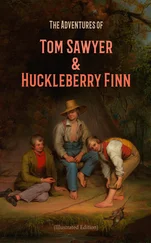On the contrary, she began to get miserly as her bank-account grew. She grieved to part with a cent, poor creature, for twice in her hard-working life she had known what it was to be hungry, cold, friendless, sick, and without a dollar in the world, and she had a haunting dread of suffering so again. Well, at last Dan died; and the boys, in testimony of their esteem and respect for him, telegraphed to Mrs. Murphy to know if she would like to have him embalmed and sent home, when you know the usual custom was to dump a poor devil like him into a shallow hole, and then inform his friends what had become of him. Mrs. Murphy jumped to the conclusion that it would only cost two or three dollars to embalm her dead husband, and so she telegraphed "Yes." It was at the "wake" that the bill for embalming arrived and was presented to the widow.
She uttered a wild, sad wail that pierced every heart, and said, "Sivinty-foive dollars for stooffin' Dan, blister their sowls! Did thim divils suppose I was goin' to stairt a Museim, that I'd be dalin' in such expinsive curiassities!"
The banker's clerk said there was not a dry eye in the house.
The Scriptural Panoramist
Table of Contents
"There was a fellow traveling around in that country," said Mr. Nickerson, "with a moral-religious show—a sort of scriptural panorama—and he hired a wooden-headed old slab to play the piano for him. After the first night's performance the showman says:
"'My friend, you seem to know pretty much all the tunes there are, and you worry along first rate. But then, didn't you notice that sometimes last night the piece you happened to be playing was a little rough on the proprieties, so to speak—didn't seem to jibe with the general gait of the picture that was passing at the time, as it were—was a little foreign to the subject, you know—as if you didn't either trump or follow suit, you understand?'
"'Well, no,' the fellow said; 'he hadn't noticed, but it might be; he had played along just as it came handy.'
"So they put it up that the simple old dummy was to keep his eye on the panorama after that, and as soon as a stunning picture was reeled out he was to fit it to a dot with a piece of music that would help the audience to get the idea of the subject, and warm them up like a camp-meeting revival. That sort of thing would corral their sympathies, the showman said.
"There was a big audience that night—mostly middle-aged and old people who belong to the church, and took a strong interest in Bible matters, and the balance were pretty much young bucks and heifers—they always come out strong on panoramas, you know, because it gives them a chance to taste one another's complexions in the dark.
"Well, the showman began to swell himself up for his lecture, and the old mud-jobber tackled the piano and ran his fingers up and down once or twice to see that she was all right, and the fellows behind the curtain commenced to grind out the panorama. The showman balanced his weight on his right foot, and propped his hands over his hips, and flung his eyes over his shoulder at the scenery, and said:
"'Ladies and gentlemen, the painting now before you illustrates the beautiful and touching parable of the Prodigal Son. Observe the happy expression just breaking over the features of the poor, suffering youth—so worn and weary with his long march; note also the ecstasy beaming from the uplifted countenance of the aged father, and the joy that sparkles in the eyes of the excited group of youths and maidens, and seems ready to burst into the welcoming chorus from their lips. The lesson, my friends, is as solemn and instructive as the story is tender and beautiful.'
"The mud-jobber was all ready, and when the second speech was finished, struck up:
"Oh, we'll all get blind drunk
When Johnny comes marching home!
"Some of the people giggled, and some groaned a little. The showman couldn't say a word; he looked at the pianist sharp, but he was all lovely and serene—he didn't know there was anything out of gear.
"The panorama moved on, and the showman drummed up his grit and started in fresh.
"'Ladies and gentlemen, the fine picture now unfolding itself to your gaze exhibits one of the most notable events in Bible history—our Saviour and His disciples upon the Sea of Galilee. How grand, how awe-inspiring are the reflections which the subject invokes! What sublimity of faith is revealed to us in this lesson from the sacred writings! The Saviour rebukes the angry waves, and walks securely upon the bosom of the deep!'
"All around the house they were whispering, 'Oh, how lovely, how beautiful!' and the orchestra let himself out again:
"A life on the ocean wave,
And a home on the rolling deep!
"There was a good deal of honest snickering turned on this time, and considerable groaning, and one or two old deacons got up and went out. The showman grated his teeth, and cursed the piano man to himself; but the fellow sat there like a knot on a log, and seemed to think he was doing first-rate.
"After things got quiet the showman thought he would make one more stagger at it, anyway, though his confidence was beginning to get mighty shaky. The supes started the panorama grinding along again, and he says:
"'Ladies and gentlemen, this exquisite painting represents the raising of Lazarus from the dead by our Saviour. The subject has been handled with marvelous skill by the artist, and such touching sweetness and tenderness of expression has he thrown into it that I have known peculiarly sensitive persons to be even affected to tears by looking at it. Observe the half-confused, half-inquiring look upon the countenance of the awakened Lazarus. Observe, also, the attitude and expression of the Saviour, who takes him gently by the sleeve of his shroud with one hand, while He points with the other toward the distant city.'
"Before anybody could get off an opinion in the case the innocent old ass at the piano struck up:
"Come rise up, William Ri-i-ley,
And go along with me!
"Whe-ew! All the solemn old flats got up in a huff to go, and everybody else laughed till the windows rattled.
"The showman went down and grabbed the orchestra and shook him up and says:
"'That lets you out, you know, you chowder-headed old clam. Go to the doorkeeper and get your money, and cut your stick—vamose the ranch! Ladies and gentlemen, circumstances over which I have no control compel me prematurely to dismiss the house.'"
Table of Contents
It is a good thing, perhaps, to write for the amusement of the public, but it is a far higher and nobler thing to write for their instruction, their profit, their actual and tangible benefit. The latter is the sole object of this article. If it prove the means of restoring to health one solitary sufferer among my race, of lighting up once more the fire of hope and joy in his faded eyes, of bringing back to his dead heart again the quick, generous impulses of other days, I shall be amply rewarded for my labor; my soul will be permeated with the sacred delight a Christian feels when he has done a good, unselfish deed.
Having led a pure and blameless life, I am justified in believing that no man who knows me will reject the suggestions I am about to make, out of fear that I am trying to deceive him. Let the public do itself the honor to read my experience in doctoring a cold, as herein set forth, and then follow in my footsteps.
When the White House was burned in Virginia City, I lost my home, my happiness, my constitution, and my trunk. The loss of the two first named articles was a matter of no great consequence, since a home without a mother, or a sister, or a distant young female relative in it, to remind you, by putting your soiled linen out of sight and taking your boots down off the mantelpiece, that there are those who think about you and care for you, is easily obtained. And I cared nothing for the loss of my happiness, because, not being a poet, it could not be possible that melancholy would abide with me long. But to lose a good constitution and a better trunk were serious misfortunes. On the day of the fire my constitution succumbed to a severe cold, caused by undue exertion in getting ready to do something. I suffered to no purpose, too, because the plan I was figuring at for the extinguishing of the fire was so elaborate that I never got it completed until the middle of the following week.
Читать дальше












